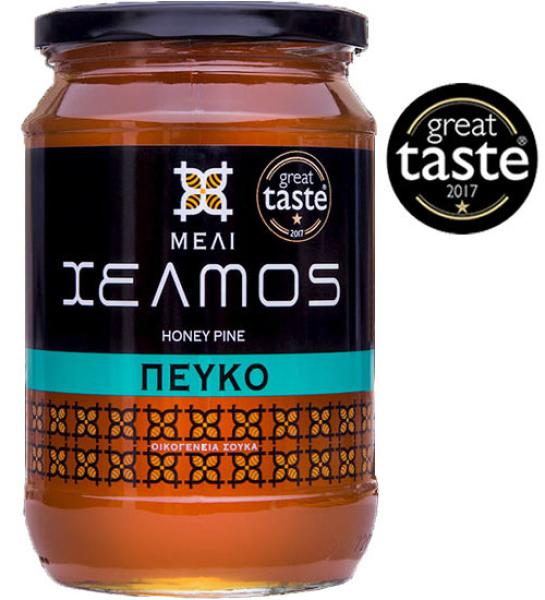Pine honey
Pine honey is produced by the Soukas family in northern Evia. It constitutes 65% of the total honey production in Greece and comes from the honey secretions of the insect Marchalina hellenica, when it parasitizes in Aleppo and Pinus brutia.
Taste: Due to its low sugar content, it is not too sweet.
Nutritional value: Pine honey is considered honey of high nutritional value, which is indicative of the high percentage of ash it has. That is mainly due to the large number of different substances that are present in its composition. The most dominant substances are the minerals and trace elements (calcium, magnesium, zinc, iron, copper, etc.), which are found in large concentrations in Greek pine honey.
Aroma: Special. Some people liken it to the scent of iodine.
Color: The color of pine honey is characteristic and darker than thyme. In fact, what is produced in spring is lighter and clearer than what is produced in autumn.
Crystallization: The crystallization of pine honey takes place at a fairly slow rate since its natural glucose content is low. More specifically, pure pine honey remains liquid, namely, without crystallizing, for more than a year and a half.
Main features
Specifications
Dimensions
The Helmos Beekeeping
Soukas family produces honey for more than half a century.
Grandpa Nikolaos placed the first beehive at his beloved mountain, Helmos .
He conveyed the same love to his son George, founder of "HELMOS BEEKEEPING" in Ano Lousos, Kalavrita.
The third generation continues the family’s tradition and produces 15 varieties of honey, Bio pollen, royal jelly, honey products, sesame bars and healing beeswax cream.
The importance of honey over the years
As it is said that honey never spoils and is immortal, it was the food of gods in antiquity. According to mythology, the Bee was the nurturer of the god Zeus, father of the gods, and honey was the food of the Olympian gods.
In Homer's Odyssey, honey is also called "melikraton"(meli-=honey), i.e. a mixture of honey and milk, which they drank as a fine drink.
Moreover, it is stated that honey came to Greece from Ancient Egypt. In fact, in the well-known city of Minoan civilization in Crete, called Phaistos, it is said that ceramic beehives from 3400 BC were found, while in Knossos, gold jewellery depicting two bees holding a honeycomb.
In Sparta, it is said that, while teenagers were trained as soldiers, they were transported to the mountains for a month, being fed exclusively with honey (honeymoon).
Systematic beekeeping is reported to have been applied in Greece since the 15th century AC.
Even today, honey is considered a nutritional treasure and is known, in addition to its full flavour, for its antibacterial and antifungal properties. It is said that honey enhances memory, is one of the best natural antitussives, helps treat dry skin, helps you sleep better, and in general, that the combination of all of its nutrients, contributes positively to the human body.
































